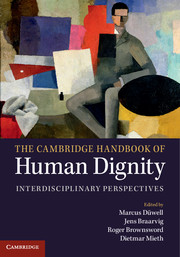Book contents
- Frontmatter
- Contents
- List of contributors
- Foreword
- Why a handbook on human dignity?
- Acknowledgments
- 1 Human dignity from a legal perspective
- 2 Human dignity: concepts, discussions, philosophical perspectives
- Part I Origins of the concept in European history
- 3 Meritocratic and civic dignity in Greco-Roman antiquity
- 4 Human dignity in the Middle Ages (twelfth to fourteenth century)
- 5 Human dignity in late-medieval spiritual and political conflicts
- 6 Human dignity in Renaissance humanism
- 7 The Council of Valladolid (1550–1551): a European disputation about the human dignity of indigenous peoples of the Americas
- 8 Martin Luther's conception of human dignity
- 9 Natural rights versus human dignity: two conflicting traditions
- 10 Rousseau and human dignity
- 11 Human dignity and socialism
- 12 Human dignity in the Jewish tradition
- Part II Beyond the scope of the European tradition
- Part III Systematic conceptualization
- Part IV Legal implementation
- Part V Conflicts and violence
- Part VI Contexts of justice
- Part VII Biology and bioethics
- Appendix 1 Further reading
- Appendix 2 Universal Declaration of Human Rights
- Index
- References
8 - Martin Luther's conception of human dignity
from Part I - Origins of the concept in European history
Published online by Cambridge University Press: 05 March 2015
- Frontmatter
- Contents
- List of contributors
- Foreword
- Why a handbook on human dignity?
- Acknowledgments
- 1 Human dignity from a legal perspective
- 2 Human dignity: concepts, discussions, philosophical perspectives
- Part I Origins of the concept in European history
- 3 Meritocratic and civic dignity in Greco-Roman antiquity
- 4 Human dignity in the Middle Ages (twelfth to fourteenth century)
- 5 Human dignity in late-medieval spiritual and political conflicts
- 6 Human dignity in Renaissance humanism
- 7 The Council of Valladolid (1550–1551): a European disputation about the human dignity of indigenous peoples of the Americas
- 8 Martin Luther's conception of human dignity
- 9 Natural rights versus human dignity: two conflicting traditions
- 10 Rousseau and human dignity
- 11 Human dignity and socialism
- 12 Human dignity in the Jewish tradition
- Part II Beyond the scope of the European tradition
- Part III Systematic conceptualization
- Part IV Legal implementation
- Part V Conflicts and violence
- Part VI Contexts of justice
- Part VII Biology and bioethics
- Appendix 1 Further reading
- Appendix 2 Universal Declaration of Human Rights
- Index
- References
Summary
Martin Luther's notion of human dignity is, in line with the entire Christian tradition, identical to the notion of humankind as the image of God (Gen. 1.26f). This at once determines the horizon within which Luther – critically – engages the corresponding notions of humankind as the image of God in scholasticism and mysticism, Renaissance philosophy and humanism (cf. Trinkaus 1970; Ebeling 1975: 320–4). With respect to his understanding of the idea of humankind as the image of God, Luther's most prominent document is the Disputatio de homine (1536), which discusses this understanding in light of the dispute between philosophy and theology (WA 39 I: 175–7). As becomes clear from a glance at thesis 20, the very first thesis announces how fundamentally controversial the basic anthropological notion is: ‘Philosophy, human wisdom, defines human beings as endowed with the gift of reason, with senses and with corporeality’ (WA 39 I: 175.3f). Following this classical determination of the human being as ‘rational animal’ or ‘zoon logon echon’, which stems from the Aristotelian tradition, theses 2–19 contain a critical engagement with philosophical anthropology. According to Luther, theology, on the ground of its universal claim to truth, cannot restrict itself to moving within a religious domain nor can it simply integrate and subject itself to philosophical standards. As such, then, it is the nature of theology as an academic discipline – as critical reference to other universal claims to truth – to engage in conflict and dispute.
Thesis 20, contrasting itself to this flawed philosophical understanding, states: ‘Theology, on the contrary, defines, from the fullness of its wisdom, humans as whole and perfect.’ Luther offers – and this is the point of his understanding of human dignity – a doctrine of humankind that is grounded in the theology of justification through and through, and is defined by the core statement (thesis 32): ‘In Romans 3[:28], “For we maintain that a person is justified by faith apart from the works of the law”, Paul briefly summarizes the definition of humankind in the statement that humankind is justified by faith (hominem iustificari fide).’ This means that humankind – any human without exception – is, without any merit or any worth that he could grant himself or expect from other humans as recognition, unconditionally and absolutely recognized and valued by his creator, redeemer and perfecter.
- Type
- Chapter
- Information
- The Cambridge Handbook of Human DignityInterdisciplinary Perspectives, pp. 101 - 107Publisher: Cambridge University PressPrint publication year: 2014
References
- 1
- Cited by



